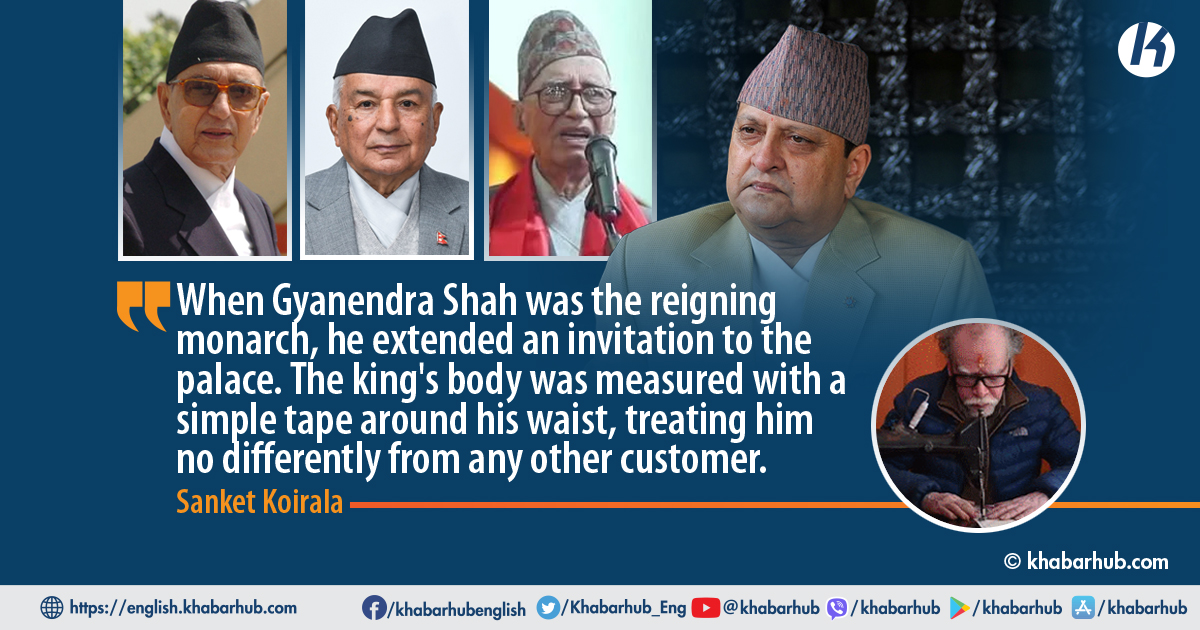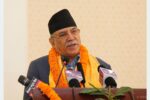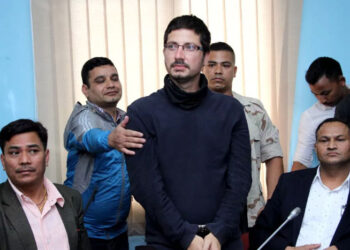For over seven to eight decades, the life of a humble tailor in Kathmandu has revolved around the art of sewing.
While most children begin their lives with the first alphabet, this tailor’s journey never led him to the schoolroom.
Instead, at the tender age of 10 or 11, he embarked on the path of sewing, starting with his father’s clothes.
His father, Maheshwar Bahadur Shrestha, sent five of his six sons to school, reserving this path for his son.
While the setting sun desired to witness his children as the rising sun, this tailor remained steadfastly loyal to his craft.
He never succumbed to the allure of aplhabets, as he had already become a master of the art of creating well-fitted garments. His love for weaving fabric with thread led him to become a true seeker of skill.
Ram Krishna Shrestha, a devotee of Karma (work), is a remarkable individual who doesn’t merely sew circles onto walls but counts among his customers high-ranking leaders and administrators.
From former King Gyanendra to the common people, he has stitched garments, especially “daura suruwal” that span three generations of the palace.
When Gyanendra Shah was the reigning monarch, he extended an invitation to the palace.
Ram Krishna’s skill in fulfilling orders promptly and efficiently earned him the trust of many, including Gorakhshamsher Rana, Prabhakar Shamsher Rana, and Sharad Chandra Shah.
The king’s body was measured with a simple tape around his waist, treating him no differently from any other customer.
When the tailor presented the finished clothes to the king, all he received was a polite “Nice,” leaving him puzzled.
It was only when his daughter explained that “nice” meant good that he breathed a sigh of relief.
Not only did Ram Krishna sew for the former King, but he also tailored the clothes for Dr. Ram Baran Yadav, the country’s first president, who took his presidential oath wearing a daura surwal stitched by Shrestha.
This memorable achievement was accomplished in just one day. Even the current President, Ram Chandra Poudel, has benefited from Ram Krishna’s exceptional skills.
His clientele included not only those who cherished the “daura suruwal” but also those who admired his craftsmanship.
He found a special place in the hearts of leaders like Girija Prasad Koirala, Nepal’s first Prime Minister in the Republic era, and Kirtinidhi Bista, the former Prime Minister.
Koirala, who wore a “daura suruwal” sewn by Ram Krishna until his final days, was known to be a tough nut to crack.
He was a man who wouldn’t compromise his principles even after forming a deep connection.
Ram Krishna took pride in the fact that those who wore his creations were men of integrity, untainted by corruption.
His long-standing friendship with former Prime Minister Sher Bahadur Deuba was evident through the numerous “daura suruwals” he crafted for him, including during his fifth swearing-in as Prime Minister.
This tailor’s work even made it to television screens, a source of great delight for him.
Leaders like Gyanendra Bahadur Karki and his father, Krishnamohan Karki, were also among Ram Krishna’s satisfied customers.
He had the honor of preparing garments for Dr. Ramsharan Mahat, Balkrishna Khand, Bikram Pandey, and Prem Bahadur Singh, who were prominent figures in many political marches.
Bikram Pandey, a leader of the Rashtriya Prajatantra Party, was so pleased with Ram Krishna’s work that he gifted him a sewing machine.
The former finance minister, Shankar Prasad Koirala, admired Ram Krishna’s skills as he ascended through various government positions.
Even high-ranking officials like Chief Commissioner of Abuse of Authority Commission Premkumar Rai, former Chief Secretary Dr. Bimal Prasad Koirala, and Somlal Subedi were drawn to Ram Krishna’s craftsmanship.
The list of satisfied customers extended beyond public figures, including former Inspector General of Police Achyut Krishna Kharel, who remained impressed by his work.
What made “Daura Suruwal” sewn by Ram Krishna famous? It was his attention to detail.
When Adhiraj Kumar Dhirendra expressed dissatisfaction with the shrinking of Daura’s fabric, Ram Krishna found a solution by using thicker cloth.
This innovation, he claimed, marked his status as a pioneer during his time.
This tailor’s profession sustained his family’s dalbhat (traditional Nepali meal) and duku (traditional Nepali clothing). Despite the absence of a shop or signboard, his work kept him occupied on the third floor of his home, without any grand ambitions or complaints.
Despite undergoing prostate surgery and battling a COVID infection, Ram Krishna continued to work diligently.
Even though his family and doctors advised against it, he eventually gave up sewing after seven decades of dedicated service.
However, his legacy lives on through the garments he crafted, representing the last breath of a dying tradition.
Ram Krishna’s skill in fulfilling orders promptly and efficiently earned him the trust of many, including Gorakhshamsher Rana, Prabhakar Shamsher Rana, and Sharad Chandra Shah.
Unlike some who rush to complete work, Ram Krishna knew how to pace himself, ensuring that even those initially confused by his work returned as satisfied customers. Artist Madan Krishna Shrestha was one of the few exceptions.
Ram Krishna’s residence is just a five-minute walk from Maitidevi Chowk towards Ghatekulo, in the southwest direction.
Ram Krishna doesn’t regret not having a son to pass on his skills, as he believes it’s not the lineage that matters, but how the leaders who wear his “daura suruwal” serve the public interest.
His skills have garnered him a diverse clientele, including presidents and prime ministers, yet he remains modest and unassuming.
His craft has also been enhanced by the support of his co-religionist, Bishnumaya Shrestha, who assists him with her own remarkable skills during morning and evening rituals.
This tailor’s profession sustained his family’s dalbhat (traditional Nepali meal) and duku (traditional Nepali clothing). Despite the absence of a shop or signboard, his work kept him occupied on the third floor of his home, without any grand ambitions or complaints.
Every day, after visiting the Pashupati temple, he would return home by 6 o’clock, working together with his family.
With seven daughters, they cherished their shared daily routine, finding joy in their grandchildren’s future.
Ram Krishna doesn’t regret not having a son to pass on his skills, as he believes it’s not the lineage that matters, but how the leaders who wear his “daura suruwal” serve the public interest.
He has maintained equal relationships with all his customers, never showing favoritism for personal gain.
Instead, he has flowed through life like a river, unwavering and steadfast, a testament to the enduring spirit of craftsmanship.









Comment